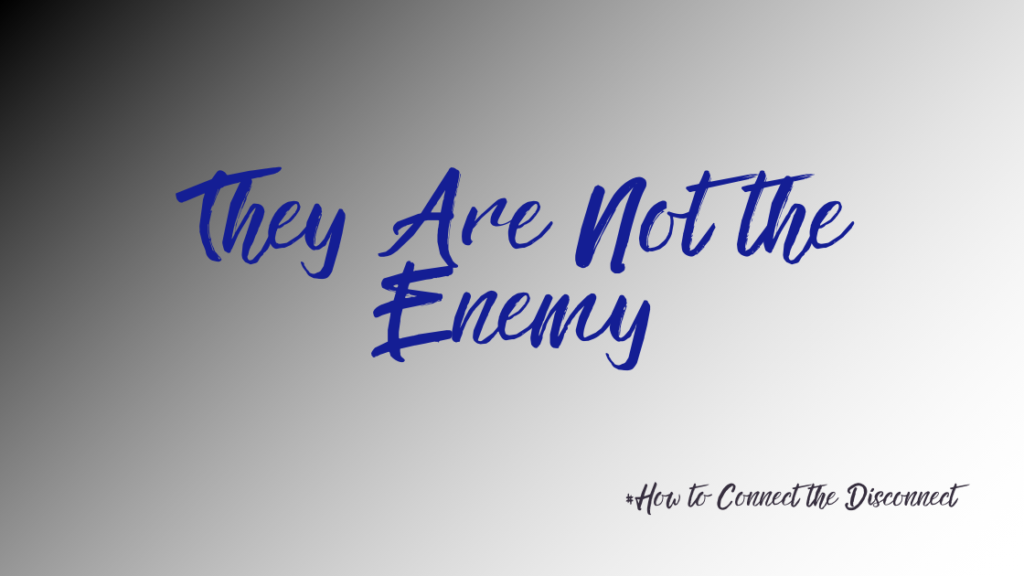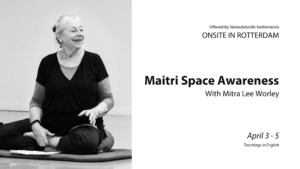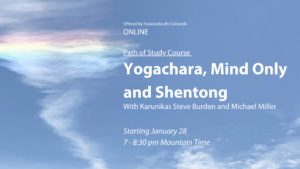They Are Not the Enemy
In a world increasingly shaped by conflict and fear, it has become alarmingly easy to believe that some people are “the enemy.” We’re bombarded with messages that “they” are dangerous, wrong, or less than human. Battle lines are drawn—left and right, us and them, sinners and saints. Our culture has become fluent in the language of othering. And in our pain, it can feel like moral clarity to declare: They are evil, and we are good.
But what if this “us versus them” mindset doesn’t bring clarity at all? What if it disconnects us, not only from others, but from our own humanity?
Dehumanization Produces Disconnection
Dehumanization isn’t just hatred—it’s the collapse of empathy. It happens when we stop imagining that others feel as we do, when we reduce them to threats, labels, or objects. We begin to think: “They aren’t like me. They don’t deserve care.”
This mindset has made cruelty and oppression possible throughout history. But it also surfaces in daily life—in how we judge those we disagree with, mock those who are different, or shut out entire groups from our compassion.
Dehumanization can be described in different ways. Psychologically, it occurs when we see others as subhuman—like animals or viruses. Propaganda often encourages this through degrading imagery and language: calling people “criminals,” “vermin,” or “sinners.” We dehumanize when we act in ways that deny another’s personhood, even if we don’t consciously think of them as “less than.” For instance, when we support systems that deny fundamental rights to some people, that is a form of dehumanization.
When we view certain people as ignorant, evil, or undeserving—whether we are talking about unhoused folks, immigrants, trans people, or political opponents—we begin to justify harm.
The New Anti-Empathy Movement
Before people are exploited, imprisoned, or exterminated, they are first made into an “it.” They are not seen as parents. Nor as neighbors. Nor as people with dreams and heartbreaks. They are just a threat. Just “them.”
When we tell ourselves “They are not like me,” something crucial is lost. We stop being curious about the value of difference. We stop listening. We stop seeing others as fully human. They become things to defend against, not people we can understand. That emotional hardening makes our cruelty feel justified. We do and allow terrible things to be done to protect ourselves or the world from “them.”
Empathy—the antidote to dehumanization—is increasingly under attack. Some religious voices now warn against the “sin of empathy,” insisting that compassion should be reserved only for fellow believers. Others dismiss such compassion as “toxic,” “naïve,” or a sign of “feminine weakness.” Still others promote nationalism over universal concerns, urging us to prioritize “our own” above all else. Rather than cultivating boundless compassion, these views construct hierarchies of who is worthy of care.
This is a trap. It allows people to feel spiritual or religious while justifying what is, in truth, the antithesis of all genuine spiritual teachings: to love others as we wish to be loved.
Compassion Without Limits
The Buddha taught that all beings want to be happy and free from suffering. Therefore, all beings are worthy of our compassion—not just those who agree with us, or those in our religion or nation. Love is not about forcing a worldview, culture, or code of ethics onto anyone; it’s about acknowledging our shared condition. Despite our differences, you and I share a fundamental sense of embodiment. We feel alive. Our shared vulnerability to life’s ups and downs, pleasures and pains, successes and failures unites us. We are not enemies.
When we become aware of our shared capacity to feel, we treat others as we want to be treated. The Karaniya Metta Sutta gives a striking metaphor for this kind of love:
Let none through anger or ill-will
Wish harm upon another.
Even as a mother protects with her life
Her child, her only child,
So with a boundless heart
Should one cherish all living beings.
Loving kindness has no exceptions. Even those who terrify, disgust, or enrage us are beings who feel pain and long for happiness. Even those who actively oppose empathy are worthy of it.
That’s a hard truth, especially when the harm is real, when you are the one being dehumanized. And yet, history is filled with people who, in the face of oppression, responded with empathy and love. You can too.
Empathy for the Anti-Empath: A Radical Practice
It may feel absurd—or infuriating—to suggest compassion for those who mock or reject empathy. And yet, that’s exactly what the bodhisattva vow calls for. We are not excusing mistreatment, but we refuse to let hatred rule us. This response preserves our own and others’ dignity. Compassionate warriorship.
Buddha taught the four immeasurables—loving kindness, compassion, sympathetic joy, and equanimity—to monks who were being harassed by demons. The solution he offered? Cultivate love and compassion, even for those doing harm.
We don’t break the cycle of violence by responding with violence. As Martin Luther King Jr. said, “Darkness cannot drive out darkness; only light can do that. Hate cannot drive out hate; only love can do that.” He could have been quoting the Buddha from the Dhammapada, “In this world, hate never yet dispelled hate. Only love dispels hate.”
Those who reject empathy have been shaped by fear, trauma, ideology, or isolation. Some were punished for opening their hearts and now carry an internalized oppressor that warns them to stay guarded or to hurt others before they themselves are hurt. Some people fear being cast out of the only community they’ve ever known. Some believe that caring for the “wrong” people might lead to eternal punishment. And others think that certain people are already bound for hell and use that to justify causing a “lesser” harm in the here and now.
Many people are simply products of their upbringing and conditioning. They’ve never questioned the messages they absorbed from peers, parents, or pundits. For some, choosing the simplicity of a black-and-white perspective offers comfort in a world full of ambiguity and uncertainty.
Empathy asks us to expand our perspective, to go beyond the familiar, to hold space for diversity and disagreement. That can be frightening. To allow others to live differently than we do is to admit that we might change too, and change, with all its possibilities, can feel terrifying. Therefore, some people choose to guard their hearts with contempt.
But contempt is not strength. It is armor worn by a frightened heart. It is an expression of a deep disconnect. And empathy, love, and compassion are the antidotes.
The Real Enemy
The person on the other side of a political or religious divide is not my enemy. The real enemy—if we must name one—is the process of dehumanization itself. It’s the mistaken belief that we can divide the world into worthy and unworthy beings.
When we internalize the narrative of enemies and friends, we create a war within ourselves. We disconnect from our humanity. We feed a cycle of violence that never ends—until we choose to end it.
Even those who disgust or terrify us have the capacity for awakening. They laugh. They fear death. They long to be free. They are not the enemy. They are us.
A Call To Action
Choose one or two of these simple ways to embody empathy and commit to them for a set period—a day, a week, or a month. You can then choose one or two others to try for a while.
Expand Your Circle of Care
Include those outside your social or political in-group in your meditations, prayers, or metta practices. Seek to understand and befriend “the other.”
Set Healthy Boundaries
Empathy doesn’t mean self-sacrifice. Discern when to engage, when to rest, and when to walk away. Boundaries are a form of self-love and protect your ability to stay empathic for the long term.
Educate Yourself
Learn how dehumanization is spread through propaganda, fear, and language. Awareness of the media we consume is a defense against losing your empathy. Take breaks from sources that thrive on fear, conflict, and division.
Soften Your Speech
In conversation—especially online—use language that affirms dignity, even in disagreement. Don’t feed the trolls.
Practice Daily Empathy
Offer a kind word, your full presence, or an act of service. Connect with other beings. Little things restore the heart.
Be Brave
Don’t let fear or ideology close your heart. Return to love again and again, especially when it’s hard to do so.
Be Kind to Yourself Too
Compassion fatigue is real. You’ll make mistakes. You’ll get tired. Forgive yourself. Regulate your nervous system with high-quality sleep, time in nature, healthy food, deep breaths, and self-care. You can’t show up for others if you’re constantly depleted.

Ben is a dharma practitioner living in Colorado who enjoys being in nature.






